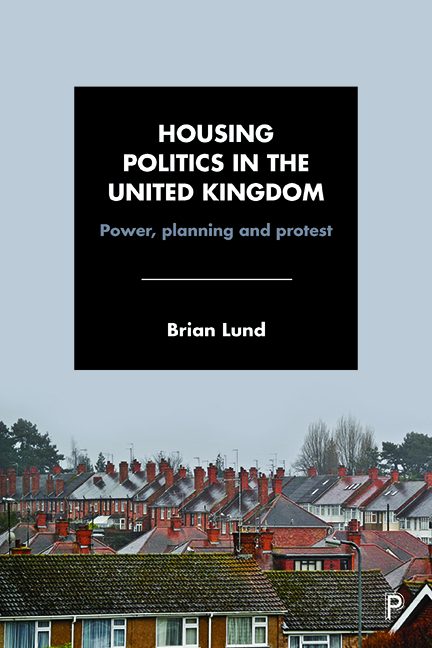Book contents
- Frontmatter
- Contents
- Acknowledgements
- Preface
- one Housing and politics
- two Land politics
- three Urban renewal: fencing the cities
- four Private landlords: ‘Rachmans’ or ‘residential property-owners’?
- five A property-owning democracy?
- six Eclipsing council housing
- seven Bending the ‘Third Arm’: politicians and housing associations
- eight Homelessness politics
- nine Devolution: where is the difference?
- ten Conclusion: power, planning and protest
- References
- Index
seven - Bending the ‘Third Arm’: politicians and housing associations
Published online by Cambridge University Press: 05 April 2022
- Frontmatter
- Contents
- Acknowledgements
- Preface
- one Housing and politics
- two Land politics
- three Urban renewal: fencing the cities
- four Private landlords: ‘Rachmans’ or ‘residential property-owners’?
- five A property-owning democracy?
- six Eclipsing council housing
- seven Bending the ‘Third Arm’: politicians and housing associations
- eight Homelessness politics
- nine Devolution: where is the difference?
- ten Conclusion: power, planning and protest
- References
- Index
Summary
In the 1960s and 1970s, it became conventional to refer to housing associations as housing's ‘third arm’. Neither private, for-profit, trading bodies, nor elected local authorities, associations were seen as suited to accommodating people with ‘special needs’ and operating in ‘niche markets’, especially reconditioning inner-city properties. Their independence from local electoral politics meant that they could assist controversial groups, such as ex-prisoners, and campaign on housing issues. Diversity in their volunteer management committees and the housing needs they met were regarded as great strengths. All the major parties supported housing associations but for different reasons. The Liberal Party viewed them as an element in the path to a participatory democracy. The Conservative Party perceived housing associations as an alternative to local authorities, whereas, in the 1970s, ‘old’ Labour looked to associations, with their growing radical dimension, as vehicles to ‘socialise’ private landlordism. New Labour regarded them as a ‘social entrepreneur’ substitute for the discredited council house sector. In 1974, housing associations owned 1.5% of the housing stock in England. This had increased to 10.1% by 2014, with much of this expansion occurring after 1988 as council house-building was restricted and stock transfer from local government was encouraged.
Hybrids
Czischke (2014, p 26) has defined housing associations as ‘social purpose organisations, not owned by the State which operate on a non-profit basis’. They work between the state, communities and the market. Chevin (2013, p 62) has described them as ‘social hearted and commercially minded’.
The Housing Act 1935 gave the generic term ‘housing association’ to organisations previously known under assorted labels, including ‘housing trusts’, ‘housing societies’ and ‘public utility societies’. The Housing Act 1936 supplied a lengthy housing association definition, its essential features being an organisation for ‘constructing, improving or managing or facilitating or encouraging housing for the working class’, and with dividend rates controlled by the Treasury, they excluded profit-making for shareholder distribution. Associations were diverse in their legal status and objectives. Charitable almshouses, mainly for the elderly poor, dated back to 12th century and, at times, attracted politically controversy, as revealed in Anthony Trollope's The Warden (2004 [1855]). There were charitable trusts, such as Guinness and Peabody, and model dwelling companies wanting to demonstrate that they could supply decent homes for the poor with a return limited to 5% – historically deemed ‘fair’ (Piketty, 2014).
- Type
- Chapter
- Information
- Housing Politics in the United KingdomPower, Planning and Protest, pp. 179 - 206Publisher: Bristol University PressPrint publication year: 2016



